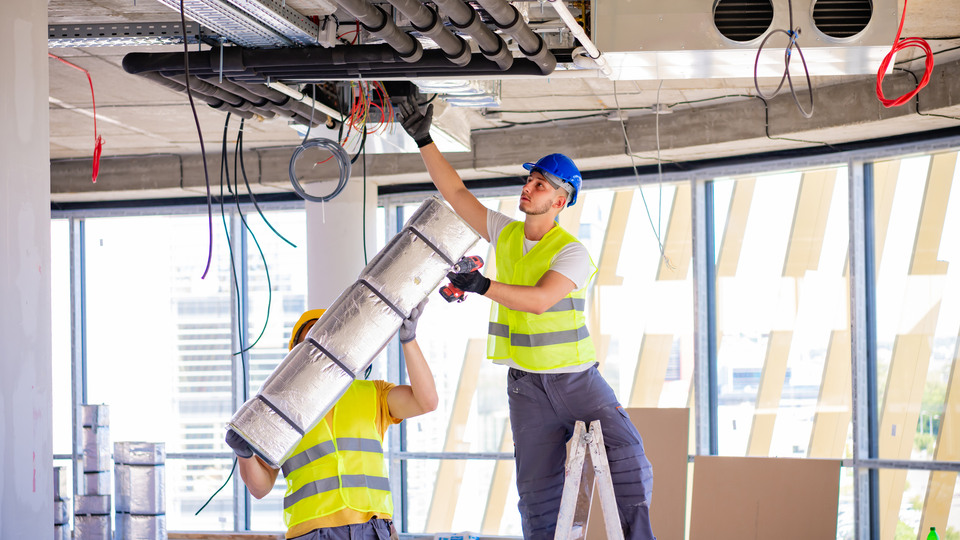
New project to reduce climate impact during renovation and rebuilding
The construction and real estate sector accounts for one-fifth of Sweden's greenhouse gas emissions. In a newly started project, IVL, together with Sveriges Allmännytta and Kommuninvest, will produce a guide for how property owners and construction contractors can reduce the climate impact of renovation and rebuilding. Eight property owners are participating in the project as test pilots.
The need to renovate the Swedish property portfolio is great, not least for buildings from the million program in the 60s and 70s. At the same time, there are significant sustainability gains to be made here through climate-smart renovation and energy efficiency improvements.
– The knowledge building that has been done for new construction in terms of climate calculations and life cycle analysis also needs to be done for renovation and rebuilding. Considering how large the large existing property portfolio is and how much will be rebuilt in the coming years, there is really potential to make a difference, says Åsa Thrysin, project manager at IVL Swedish Environmental Research Institute.
A key to reducing the climate impact from the construction sector is to increase the knowledge of both builders and contractors, and to make climate-adapted construction more sustainable also financially.
In the previous project Climate requirements at a reasonable cost, Sveriges Allmännytta, IVL, and Kommuninvest, the municipal sector's largest lender, have developed instructions for calculating the climate impact of new construction, as well as guidance for being able to set climate requirements. Based on this, stricter information requirements have also been developed regarding the climate impact in the construction phase in order to obtain a Green loan from Kommuninvest. Now the project takes the next step and focuses on climate calculations and climate requirements for renovation and rebuilding.
Test pilots will calculate the climate of renovation projects
Eight test pilots consisting of property owners and construction contractors have been selected and will carry out climate calculations for their renovation projects. Both the construction phase and operation of the projects are included. Based on the test pilots' experiences, a guide will then be produced with instructions and tools to be able to set procurement requirements for renovation and rebuilding.
– By developing knowledge material about the sustainability effects of various renovation alternatives, we hope to be able to produce guidelines that are useful to our members when they have to make sustainable decisions when renovating. They should be supported in questions about what is best to preserve and what really needs to be replaced. I am sure that we will get results that are rewarding for our members in the management of their properties, says Karl Törnmarck, Project Manager at Sveriges Allmännytta.
The project will also develop criteria for green financing of renovation projects. In this way, they want to create incentives for the industry to tighten its measures.
– It is obvious that players in the construction industry can do more, and want to do more, to limit the climate impact of buildings. Through green financing, we can both pay attention to good examples, clearly set requirements and financially stimulate investments that lead in the right direction. We hope that this project can contribute to putting increased focus on the importance of climate measures in the infrastructure that has already been built, says Björn Bergstrand, Head of Sustainability at Kommuninvest.
For more information, please contact:
Åsa Thrysin, asa.thrysin@ivl.se, +46 (0)10-788 68 87
Karl Törnmarck, karl.tornmarck@sverigesallmannytta.se, +46 (0)8-406 55 77
Björn Bergstrand, bjorn.bergstrand@kommuninvest.se, +46 (0)70-886 94 76
About the project
The research and development project Climate requirements at a reasonable cost – ROT is ongoing 2021–2022 and is funded by the Swedish Energy Agency through the research program E2B2. ROT stands for renovation, rebuilding and extension, where this project focuses on renovation and rebuilding. Project partners are IVL Swedish Environmental Research Institute, Swedish Public Benefit, Kommuninvest, Akademiska hus, Bostaden in Umeå, Castellum, Helsingborgshem, Stena Fastigheter, Svenska Bostäder, Tjörn Bostads and Wihlborgs.
